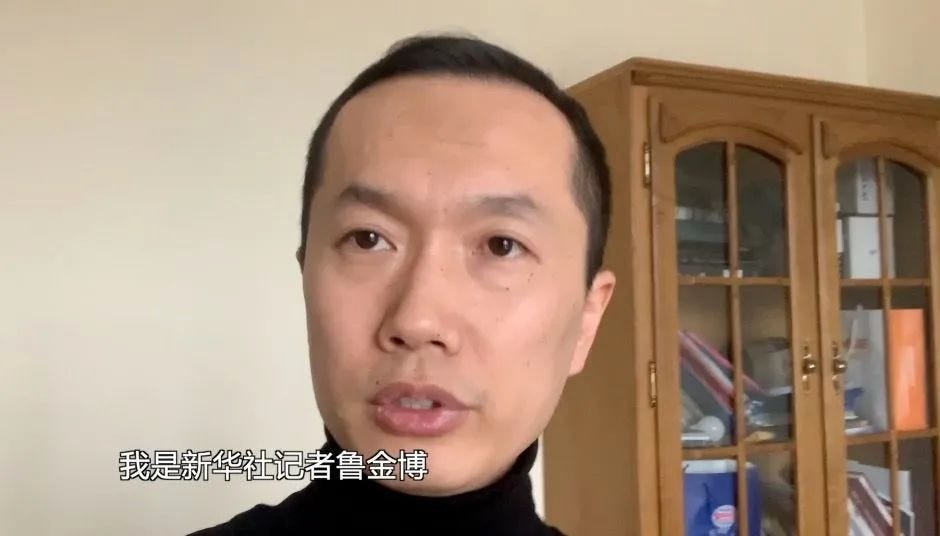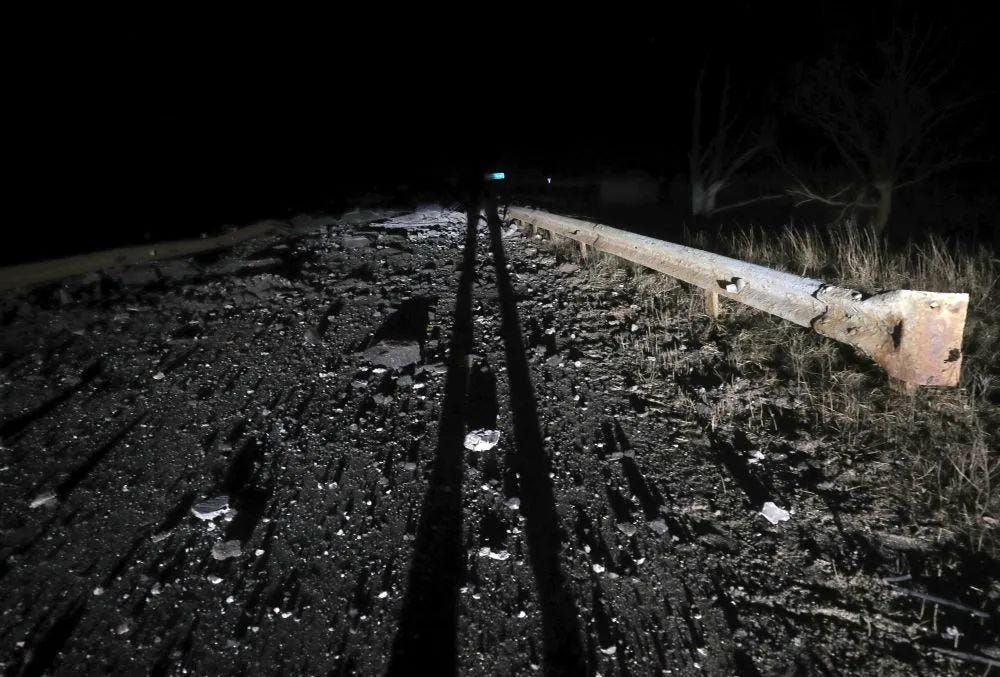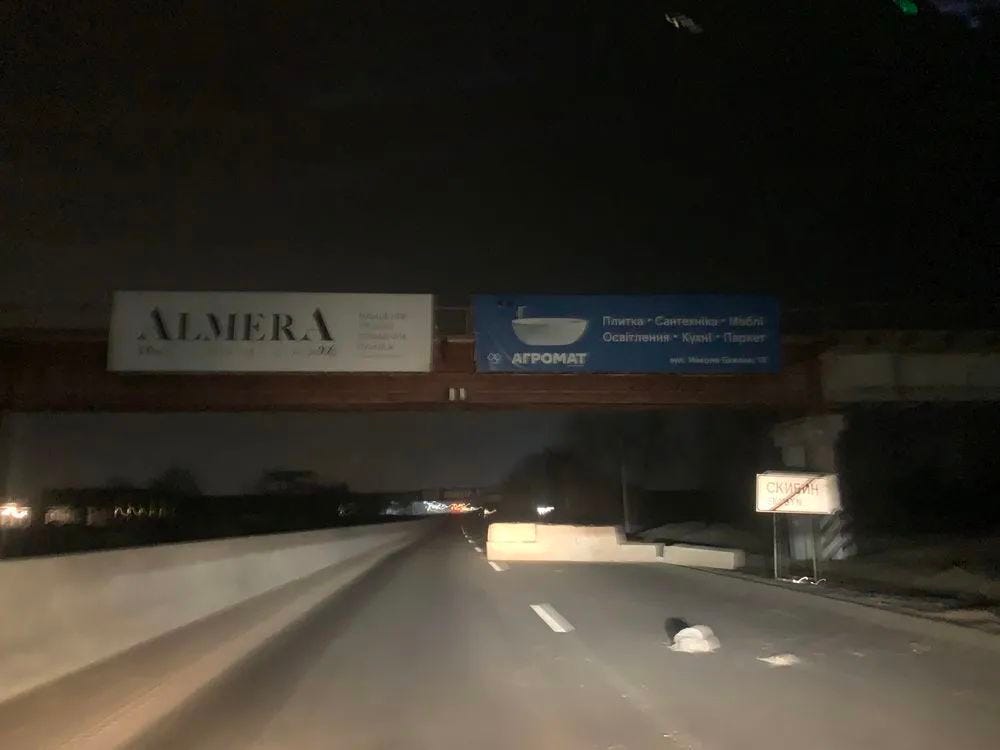As conflicts in Ukraine are unfolding, Chinese President Xi Jinping and his Russian counterpart, Vladimir Putin, mainly exchanged views on the current Ukrainian situation during their phone conversation on Friday, reported by Xinhua News Agency.
Xi said that the Chinese side supports the Russian side in solving the issue through negotiation with the Ukrainian side.
In today's newsletter, Ginger River Review presents a full translation of the story of Xinhua reporter Lu Jinbo, who drove 340 miles all night Thursday from Minsk, Belarus, where he is currently based, to Kiev for his reporting assignment. It was a journey full with dangers, hardships, and perseverance.
Xinhua correspondent Lu Jinbo
MAKE IMPOSSIBLE POSSIBLE
Early in the morning of February 24, my mobile news app frantically pushed the latest news --Russian President Vladimir Putin authorized "a special military operation" in Donbass. Receiving reporting assignment from Xinhua News Agency, I set out to look for ways to go to Ukraine from Belarus.
With no flights or trains, I managed to get a long-distance bus ticket, but an hour later the staff at the booking office contacted me: "The border is now closed. All long-distance buses are cancelled. It is impossible to get through!"
I had been to Ukraine to cover Crimea's accession into Russia and the Russia-Ukraine conflict before. I knew that there were no rules and regulations to follow in this chaotic situation. With my mission in mind, I decided to set off immediately and go to the border first to make the impossible possible!
I put my camera, a petrol drum and other equipment into my car, and made sure that my passport, business trip certificate and other customs clearance documents were all set. Then I set off!
PASS BORDER CONTROLS
The drive from Minsk, the capital of Belarus, to Kiev, the capital of Ukraine, is about 550 kms (about 340 miles), and the navigation system showed that it would take almost 8 hours to get there.
I arrived at the nearest gas station in Belarus to the Ukrainian border, tanked the car up, had two hot dogs and a cup of tea, bought a bag of bread and a large bottle of water, and started to "break through" the border.
The staff at the border controls on the Belarusian side came up and told me, "There is a war going on over there in Ukraine. You can't go there."
I immediately showed him my Belarus-based press card, Russia-based press card, passport, business trip certificate, car documents. In order to pass the customs, I added another reason: "It's urgent. My colleague in Kiev is very tired. He got sick because of the heavy reporting assignment. He needs my help!"
The staff pondered for a moment and advised me that the bridge in front of the main road had been bombed, so even if I wanted to go, I could not reach Kiev. But seeing that I was determined to go there, he finally agreed to let me get through the checkpoint with a look of admiration and reluctance. After all the formalities were completed, he came out to shake hands with me and wished me good luck.
The border checkpoint on the Ukrainian side was empty. (Photo by Lu Jinbo)
I drove the car uneasily to the border controls of the Ukrainian side, got out and walked to the post. The phones and other office equipment were there and it still had lights on, but I didn't see anyone.
Two large Belarusian trucks happened to pass by and the driver skillfully pressed the button. The fence lifted up. I asked the driver, "Wasn't it necessary for me to get an entry stamp for my passport? What shall I do when I leave Ukraine?" The driver smiled and said, "You can help yourself!"
"WHAT ARE YOU GOING TO DO IN A WAR ZONE?"
As I was driving fast on an empty road all the way to the destination, suddenly, the navigation system showed that there was no way ahead. I braked, got out of the car and saw some fragments of cement ahead. Further ahead, what was on top of the broad river was exactly the bridge that was blown off as mentioned by the staff at the checkpoint.
A bridge 30 kms into Ukraine was blown up. (Photo by Lu Jinbo)
Because the signal of the local cell phone was very poor, I could only get a general idea about the direction from the navigation system and fumble along the way. Almost every house in the nearby villages was closed. I managed to find some old men chatting outdoors. They asked me, "You're going to Kiev? The bridge was blown up, so you would not be able to get across! You want to take a detour? Then you have to drive 30 kms (about 19 miles) through the woods! It's a war zone, so what are you going to do there?"
I made various attempts to find the road, but all failed. Fortunately a car drove out of the woods, and I hastily stopped the car. The driver pointed the way for me.
The snow in the forest was melting. Because the road was muddy, I drove 5 kms (about 3.1 miles) for more than an hour. It was dark outside and pretty quiet around. I thought, "What if my car breaks down? I can't go back now. The only way out is to move forward!"
I finally drove around the broken bridge and onto the main road. I started to run into tanks and fighting vehicles from time to time. I knew that I was close to my destination!
Navigation system shows that people have to drive around Chernigov to go forward
"WHO LET YOU COME OVER HERE?"
As I drove almost to Chernigov (a city in northern Ukraine), roadblocks increased significantly and I was stopped by a Ukrainian checkpoint for the first time on this journey. I was briefly questioned and checked by Ukrainian soldiers before being released to go forward.
At the fork, it seemed that there was something on the ground that was illuminated by my car's low beam. I slowed down and figured out that it was two people who were lying on the ground being examined.
More than 10 soldiers in camouflage uniforms rushed up and shouted at me with their guns, "Stop the car! Turn off the engine!" I lowered the window and tried to wave a friendly greeting, but the guns came closer: "Hands on the steering wheel!"
I had a few quick words with them in Russian and followed their instructions to get out of the car. I opened the doors and trunk of the car and took out all my documents.
The soldiers looked very angry and kept questioning me: "Who let you come over here? How did you get here? The bridge is broken. Where did you come from? Didn't anyone stop you?"
I answered all their questions truthfully and told them what I saw and heard along the way. They checked and confirmed that there were no problems with my documents and let me pass, adding, "We are friendly with China!"
I finally saw an open gas station off the main road and I quickly went in to buy a local cell phone card. The POS machine at the gas station was broken, so I could only use cash. But I didn't have any local currency. At that moment, three rifles peeked through the door of the gas station, bringing me out in a cold sweat. It turned out to be three young police officers coming in to buy cigarettes. One of the policemen saw my difficult situation. He bought the phone card out of his own pocket and gave it to me. The phone card was 100 hryvnia (about 3 U.S. dollars) and I gave him $5 to express my gratitude.
I took the opportunity to talk to the policeman about the situation in Kiev. He said, "It's bad! Everyone is evacuating. You should leave too. It's too dangerous to go there." I asked him why he didn't leave, and he replied, "This is our home, I will stay here and guard it."
BIG BANG FROM KIEV
I resumed my journey, getting closer to Kiev. Suddenly I saw a bright flash of light in the sky, followed by a big bang. I hurried to dial the reporter at the Kiev office of Xinhua News Agency to ask if he was safe. On the phone, my colleague told me that Kiev had imposed a curfew and I might not be able to enter the city.
Roadblocks on the road close to Kiev. (Photo by Lu Jinbo)
As expected, the navigation system suddenly indicated that the road ahead was closed. Immediately after that, I saw police officers with guns. I slowed down and stopped for questioning.
After I identified myself as a Chinese journalist, the police verified the information and let me go. A police officer told me that the city might be attacked tomorrow morning. He wished me good luck with my job, and I wished him all the best.
There was finally no more checkpoint ahead! Probably because I had calmed my frayed nerves, it took me to drive around the bridge near our Kiev office three times before I found the right exit.
Finally, I rejoined my colleague who had been working on the front line for several days with illness. We will report from the forefront of the situation in Ukraine in the coming days.
Disclaimer: translation in this newsletter is done by deepl.com, with editing by Ginger River.
For China's official stance on the Russia-Ukraine conflict, you can check the minutes of the regular press conference of the Ministry of Foreign Affairs on Thursday. For mainstream Chinese scholars viewpoints on that issue, you can check the translation of their public comment composed by my friend Liu Yang.
To learn more about this newsletter, you can check the ABOUT section.
Please feel free to let me know if you have any feedback or suggestions for the contents of Ginger River Review. My email address is jjiang.sisu@hotmail.com. You can also find me on Twitter.







